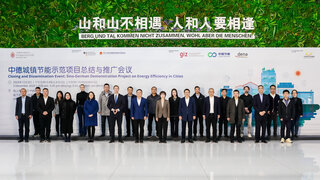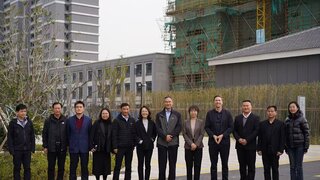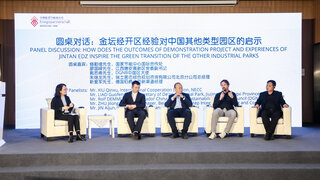Showcasing Sino-German cooperation for efficient and green energy systems in cities
Closing and Dissemination Event: Sino-German Demonstration Project on Energy Efficiency

On 3 December 2024, the closing conference of the Sino-German Demonstration Project on Energy Efficiency in Cities took place in the pilot industrial park in Jintan, Jiangsu Province. The event concluded four years of collaboration under the Sino-German Energy Partnership (EP) to increase energy efficiency and explore pathway towards climate neutral districts on the local level. By highlighting the impacts of the project, sharing the best practices of the comprehensive energy efficiency improvements in the pilot park, it further discussed how to disseminate the Sino-German demonstration experience to more regions to contribute climate goals.
Outcome: Integrated concept and measures increase energy efficiency in industrial parks
Through the Sino-German demonstration efforts, the implementing organisations developed a methodology package to support urban districts, and industrial parks to achieve climate goals. Based on German experience, an integrated approach was introduced to the pilot park Jintan EDZ focusing on planning, energy efficiency measures, and multi-stakeholder engagement.
In Jintan EDZ, the expert team developed an integrated energy efficiency concept to guide its green transition. It provided a comprehensive analysis on local energy demand and supply, exploring renewable energy expansion and energy efficiency potentials, suggested 44 implementation measures. Three energy efficiency measures were selected for implementation:
- The German Sustainable Building Council (DGNB) standard was adopted for a pilot building.
- Renewable energy solutions, including heat pumps provided by German company and building-integrated photovoltaics (BIPV), with effectiveness proven in cooperation with think tanks, were introduced to the energy supply side.
- A micro-grid system pilot by State Grid Jintan innovated decentralised renewable integration.

Impact: less carbon emissions, better market conditions for green solutions
The integrated energy efficiency concept of the pilot park shows that CO2 emissions could be reduced by 42% by 2060 compared to 2021, contributing to the park’s climate neutral future. The applied solutions (heat pumps, BIPV, micro grids) provide measurable outcomes and proven best practices to save energy, expand renewables and reduce emissions in industrial parks. This further supports the local and central government in creating climate neutrality policies and guidelines for industrial parks, driving green transformations. By disseminating the pilot practices to other cities and industrial parks across China (the country aims to pilot 100 carbon peaking and carbon neutral industrial parks), it enables more regions to adopt proven strategies for their effective energy transition and decarbonisation.
Through the multi-stakeholder approach, German private companies with established business in China were able to participate in a public tender and selected as green solution providers. This increased the recognition of German small and medium-scale companies with green transition solutions and created fairer market access conditions for German companies.
Look into the future
During the closing event, both the Chinese and German governments highly commended the achievements of the demonstration project. They expressed their strong interest in disseminating these outcomes as best practices of the Sino-German cooperation in energy efficiency, showcasing the green energy transition to further industrial parks and regions in China and internationally.
